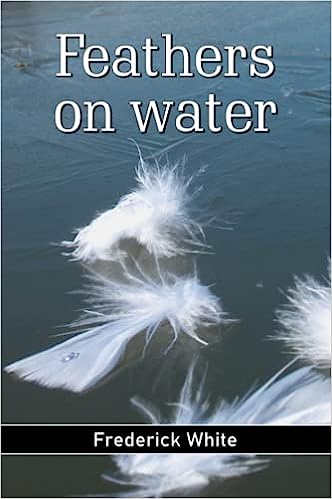
Feathers on water
In the final lines, the passage concludes with an invocation to the Mighty Maker, acknowledging the divine as the source of ultimate vision and inspiration. By surrendering to this higher power, the narrator seeks to align their vision with the divine, embracing a perspective filled with purpose and meaning.
Amazon USAFeathers on water Paperback – April 28, 2023 by Frederick White (Author)
- Publisher : Cyberwit.net (April 28, 2023)
- Language : English
- Paperback : 135 pages
- ISBN-10 : 8119228014
- ISBN-13 : 978-8119228010
- Item Weight : 8.3 ounces
- Dimensions : 5.65 x 0.34 x 8.5 inches
Feathers on water is an extraordinary book by a talented author. This poetry book helped me discover new things. I read it slowly so I could truly take in what the author was saying. I would like to explain poets view in poem 'Instantiation'.
Instantiation
When I looked to the west
At the crimson and sapphire sky
I felt the sunset in my soul
As the summer ended in my spirit: (p. 13)
The short poem captures a moment of introspection and connection with nature. It expresses a personal experience of observing a sunset and the emotions it evokes.
The opening lines set the scene as the narrator looks to the west and describes the colors of the sky as "crimson and sapphire." This choice of imagery creates a vivid and vibrant visual impression.
The statement, "I felt the sunset in my soul," conveys a deeper emotional resonance. It suggests that the beauty and grandeur of the sunset have a profound impact on the narrator's inner being. The sunset becomes a metaphorical experience that reaches beyond the physical senses and touches their core, awakening a sense of awe and wonder.
The concluding line, "As the summer ended in my spirit," adds a layer of reflection and metaphor. It implies that the passing of the summer season parallels a change or transformation within the narrator's inner self. The sunset acts as a symbolic representation of this transition, perhaps from a period of warmth and vitality to a more introspective or contemplative phase.
Overall, the poem portrays a serene and introspective moment of connection with nature. It highlights the ability of natural phenomena, such as sunsets, to evoke deep emotions and serve as catalysts for personal reflection and inner growth.
I would like to conclude this review with my view on poem Vision:
Vision
Ah, the joy of sight
such a wonderful gift
Vision has to be more than just seeing
We need insight too
We need to see with our hearts the beauty of life
The physicality of sight is only the beginning
Our hearts need to be our second eyes
Then we can see the hearts of others too
But first we must cry
Creator make my heart pure
Indeed let me be filled with gratitude
Because it is much easier to see with a thankful
heart
Let my soul be filled with a passion for truth
Let it be filled with a vision of purity
Let it be filled with you Mighty Maker
Let the vision be (p. 14)
A beautiful and heartfelt expression of the significance of vision and the deeper meaning it holds. The passage emphasizes that true vision extends beyond the physical act of seeing and calls for insight, gratitude, and emotional perception.
The initial lines celebrate the joy and wonder of sight, acknowledging it as a precious gift. However, the passage goes on to suggest that vision encompasses more than mere visual perception. It highlights the importance of insight, the ability to see and understand the world around us on a deeper level.
The ppoem then emphasizes the role of the heart in perceiving the beauty of life. It suggests that the physical act of seeing is only the beginning, and our hearts serve as a second pair of eyes. Through this emotional lens, we can not only appreciate the external beauty but also see the hearts of others, empathize, and connect with them on a deeper level.
The poem continues by acknowledging the necessity of shedding tears and purifying the heart. It calls upon the Creator to make the narrator's heart pure and fill it with gratitude. Gratitude is seen as a transformative lens through which one can better perceive the world and its inherent beauty. The mention of a passion for truth and a vision of purity further reinforces the idea that true vision encompasses moral and spiritual dimensions.
In the final lines, the passage concludes with an invocation to the Mighty Maker, acknowledging the divine as the source of ultimate vision and inspiration. By surrendering to this higher power, the narrator seeks to align their vision with the divine, embracing a perspective filled with purpose and meaning.
Overall, the poem beautifully captures the idea that true vision requires more than the physical act of seeing. It highlights the importance of emotional perception, gratitude, and a connection to something greater in order to truly appreciate the beauty and essence of life.
I highly recommend this book to all poetry lovers.
- Ruchi Agarwal
